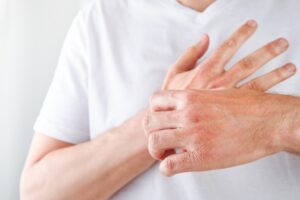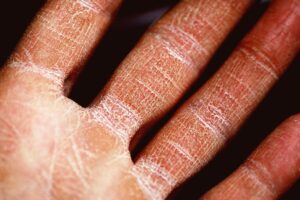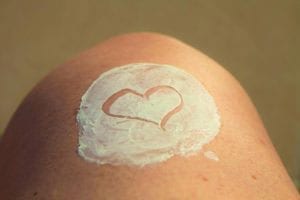Severe Atopic Dermatitis
What is severe atopic dermatitis?
A chronic inflammatory condition, severe atopic dermatitis causes itchy, dry skin. When scratched, this skin often weeps a clear fluid. This makes it more likely for people to get skin infections, whether viral, fungal, or bacterial. Severe atopic dermatitis is also commonly known as eczema. About 30% of people in the US, primarily adolescents and children, are affected by this condition, though it is not contagious.What causes severe atopic dermatitis?
It’s believed that a mix of environmental and genetic factors lead to the development of severe atopic dermatitis. It’s not uncommon for people with severe atopic dermatitis to also have allergies like hay fever, asthma, or food allergies. It also tends to be more prevalent in people who live in drier climates or cities. Specific triggers tend to make severe atopic dermatitis worse. Some of these triggers include:- Infections, like the flu or a cold
- Cold, dry air
- Irritating chemicals
- Rough materials on the skin
- Stress or high emotions
- Dyes or fragrances
- Showering without immediate moisturizing
How is severe atopic dermatitis diagnosed?
For severe cases, one needs to get a diagnosis from a doctor, typically a dermatologist. He/she may diagnosis the condition just by observation, or he/she may take a biopsy of the skin for confirmation.What are the common symptoms of severe atopic dermatitis?
Severe atopic dermatitis symptoms are pretty straightforward, and they include itchy, dry skin which often weeps a clear fluid when irritated or scratched.What are the options for severe atopic dermatitis treatment?
Treatment for severe atopic dermatitis can be easily broken down to at-home prevention, medication, and other therapies. At-home prevention:- Moisten skin multiple times a day using fragrance-free moisturizers, ointments, and/or petroleum jelly
- Maintain short fingernails and wear light gloves when sleeping to avoid scratching
- Avoid scratching (we know—easier said than done!)
- Stay away from known allergens or irritants
- Be gentle to your skin when bathing and try to limit the exposure to hot water
- Antihistamines (to control itching)
- Topical steroids
- Creams to repair the skin
- Antibiotics (for secondary infections)
- Anti-inflammatories (oral or injection)
- Corticosteroids
- Light therapy
- Stress reduction
- Wet wrap therapy (after a lukewarm bath, affected areas are covered in medication and moisturizers and then wrapped in wet gauze)
Where can I find more information about severe atopic dermatitis?
Severe Atopic Dermatitis Articles

Caleb’s Story: Having Eczema and Sensitive Skin Throughout My Youth
Patient Worthy Contributor
September 25, 2024
Read More »

Study of the Week: Severe Atopic Dermatitis May Increase Non-Hodgkin Lymphoma Risk
James Moore
June 20, 2022
Read More »


Severe Atopic Dermatitis Could Heighten Non-Hodgkin Lymphoma Risk
Jessica Lynn
June 13, 2022
Read More »


Severe Pediatric Atopic Dermatitis Linked to Learning Disabilities
Jessica Lynn
April 20, 2021
Read More »





